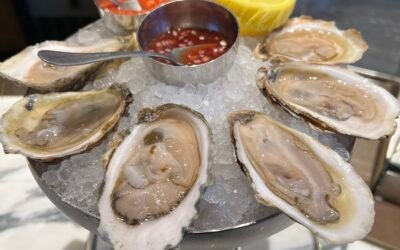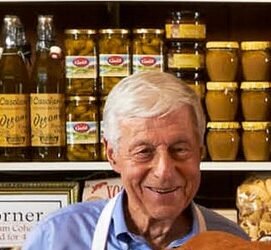Amber Lambke
AmberLambke is founder and CEO of Maine Grains in Skowhegan Maine. I first introduced myself to her as micro-baker, chef and blogger back in 2014. Since then Maine Grains has grown leaps and bounds.
I have been waiting to figure out how to get Amber to speak about her company, and now with this pandemic, it’s a good time to bake and talk. She’s kindly come on board to share with us words about grains, revitalization of her town, bread and more.
How did you become a miller?
Seeing that grains were missing from local food conversations in 2007, a grassroots group of us in Skowhegan, ME decided we would facilitate a gathering of farmers, millers, and bakers and The Kneading Conference was born. At that time, grains were considered a ‘wild card’ in locavore challenges up here in Maine- and we scratched our heads realizing that at one time in our history Maine was a huge grain producer. We set out to relearn how to grow grain in our region and inspire others to do the same. Infrastructure for cleaning and processing grain was a missing piece, so I started a mill to address that.
What’s the history behind Maine Grains?
I was practicing as a speech-language pathologist and volunteering to support the growth of our local farmer’s market when I was tapped to help start The Kneading Conference. At that first gathering of farmers, millers, bakers, seed savers and researchers in 2007 I learned that my county in Maine grew 239,000 bushels of wheat in 1837. This was enough to feed over 100,000 people in a county that is now home to 50,000. This inspired me learn about how we could reclaim some of that for the benefit of our farms, soils, local food and animal feed. Because of the lack of machinery in the state to clean and process grains, it would take a mill. Much of what was happening in the northeast for milling in 2007 was very small, even museum scale, and insufficient for feeding local communities.
By visiting the International Grains Program at Kansas State University and making connections in Denmark, Germany, Iceland, and across the US to understand the business of milling and necessary infrastructure, we put a business plan together for a multistory mill in the center of our downtown and bought a nineteenth century Victorian jailhouse to renovate and launch Maine Grains.
Tell us about Skowhegan, and how your business brought renewal to the area?
Skowhegan is a town of about 7,000 that has suffered the loss of manufacturing jobs in shoe making, wood products and wool in recent decades. It undertook a process to remake itself when it was designated a Main Street community in 2005. This designation focused the energy of businesses, the town, and citizens to find new solutions for turning the decline and despair around.
Our project is not only a centerpiece of Skowhegan’s downtown, but a catalyst for seeing our community assets in new ways. We have created 18 jobs at the mill, taken a jail- a symbol of all that goes wrong in a society- and turned it into an engine of productivity and hope. We have attracted other entrepreneurial enterprises to join us in our building, including a cafe, yarn shop, radio station, and creamery. The Kneading Conference and Bread Fair each July has become a globally recognized event that attracts 250 people to an intensive two day conference and three thousand people to its Bread Fair- a celebration of all things bread and grains. The mill works with over 40 farms in the region to source its grain and distributes throughout the Northeast.
How has grain and flour become more common in usage in our lives?
I think people are paying attention to flour more, and the story behind flour. Consciousness has been raised, and people are connecting the dots about how their daily bread happens and whether it helps farmers. They’re asking questions and expecting transparency. This is all good. We are helping people rediscover the wide variety of delicious grains that not only support good health but healthy soils. Not everyone chooses to bake at home (although COVID-19 is certainly changing that) and many people enjoy supporting the revival of local grain economies by supporting their village bakers and brewers. We believe this is good for everyone and builds community.
Are your clients more professionals or home bakers?
Maine Grains sells to bakers, brewers, chefs and home cooks. The majority of our business is to commercial bakeries, institutions, restaurants and breweries but recent events with the viral pandemic has seen retail sales of flour through our shop and online store explode.
Is it true that the northeast was the onetime breadbasket in the United States?
YES! Well, I don’t know about supplying the entire US, but it is often stated that the northeast fed the Union Army in the Civil War with its grain. It is certainly true that throughout history, grains have played an important role on the farm to manage weeds naturally, build healthy soils, provide animal feed, straw and bedding for livestock, and feed people.
How has the gristmill brought your community together?
Our community has weathered a lot see the vision of the gristmill come to life. Together with our community, we have persisted through some predictable, necessary and at times, uncomfortable phases to get to where we are today. At first, some people in the community doubted the idea, our capacity, and the viability of our idea. With each new successful step taken, we built trust and a following that could help advocate for us to take risks. The process of seeing a big risky project come to life has brought the community together and now the mill is positioned to keep helping cultivating can-do solutions and bring in partners to solve new challenges.
Flour is one of the empty shelves in our stores, how has this crisis brought baking back to people home kitchens?
This is an unprecedented time. People are turning to online shopping to provision their kitchens for anticipated quarantines and lockdowns. There is a supportive community of bakers and home cooks sharing tips and tricks and blogging about home baking and cooking strategies for those who find themselves at home, or feeding families in suddenly new routines.
What is your best selling grain?
Our freshly milled organic rolled oats and our sifted all-purpose flour are our top selling grains. They have application across many many uses.
What is your favorite grain?
I love our organic pastry flour. It is low in protein and perfect for pie crusts. While I like to experiment with sourdough bread baking, it is not my strongest suit, and I love to bake pies, both sweet and savory. The pastry flour is sweet and buttery with an alluring aroma when the liquid hits the flour in my recipes.
Lately, I am also experimenting a lot with our organic pea flour. Yellow peas are grown in rotation with grains here in Maine and can be cooked whole, or ground into flour. I discovered some recipes for “socca” and am in love with making it in our assortment of cast iron cookware at home.
What is heritage grains return doing for better bread?
Heritage grains can claim responsibility for helping people discover that different varieties of grain actually taste different. Red Fife is sweet and nutty, Danish Oland tastes of toasted oat and Estonian Sirvinta carries an aroma of chocolate when baking- these are all things we hear from Bakers. Growing them expands the biodiversity available in our regions and will lead to robust varieties that are adapted for our specific climates. Some of them fell by the wayside because they might have been lower yielding, too tall, kernels too skinny, etc. So, when Farmers grow them now, they fetch a higher price. Just like how we have come to appreciate different kinds of coffee, heirloom tomatoes and vegetables of all kinds, Heritage grains lend playfulness and strengthen the agricultural systems of our regions.







0 Comments